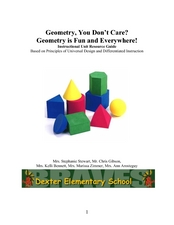Curated OER
Seasoning the School Year
Students observe the changes a class tree goes through as the seasons change and record observations in journals. They investigate changes in the weather, changes in the length of the day, and how that affects people. They create...
Curated OER
Electrifying Franklin
Fourth graders research and present information about Benjamin Franklin's life and accomplishments. In this instructional activity on Benjamin Franklin, 4th graders review idioms and sayings written by Franklin then compare and contrast...
Curated OER
Geometry is Fun and EverywhereGeometry, You Don’t Care? Geometry is Fun and Everywhere
Third graders investigate shapes in our world. In this geometry activity, 3rd graders describe plane and solid shapes and identify angles, solid objects and lines of symmetry. Students use online resources, graphic organizers and conduct...
Curated OER
The Human Skeletal System: Inside and Out
Students study bone size, structure and shape. They use various geometrical shapes to make a skeleton and produce a poster depicting the skeletal system and its functions. They arrange the pictures into the five sections, glue on...
Curated OER
Water Cycle
First graders research for information on the water cycle. They use a hot list to find pictures of the water cycle, and create a movie in Kid Pix about the water cycle.
They present Kid Pix movie to the class.
Curated OER
Egyptian Hireroglyphs
Fifth graders identify the aspects of Ancient Egyptians and Heiroglyphs. They compare and contrast Egyptian Hieroglyphs with the decimal number system. Students recognize the decimal number system and compares to bases other than ten.
Curated OER
International Festival: Mexico
Students explore the culture of Mexico through music and food. In this multicultural lesson, students read the book Mexico and listen to samples of Mexican music. Students use ingredients to make tacos.
Curated OER
Food and Languages of the World
Third graders become familiar with the German pickle, part of the Christmas celebration in Germany. In this German pickle lesson, 3rd graders listen to the story of the German pickle and its significance to the German Christmas...
Curated OER
Neighborhoods
Students examine homes around the world. In this multicultural lesson, students read the book A World of Homes and Homes Around the World. Students compare and contrast the homes in the books to their own homes. Students construct a...
Curated OER
Using Words to Work Things Out
Students recognize a problem and how to resolve it. In this lesson, students listen to The Hating Book and discuss the events of the story. Students answer comprehension questions and relate to their own experiences. Students role play...
Curated OER
International Festival: Greece
Young scholars celebrate the culture of Greece. In this multicultural lesson, students participate in several activities which examine the culture of Greece. Young scholars study the Greek alphabet, identify the country on a world map,...
Curated OER
Using Words to Work Things Out
Third graders discuss ways to use words to solve a conflict. In this conflict resolution lesson, 3rd graders read the book Angela and Alice and discuss the conflict from the story. Students brainstorm ways to solve conflicts among...
Curated OER
Poetry and Visualization
Students use visualization techniques when reading poetry. In this visualization and poetry lesson, students work in groups to present a tableau that depicts a word from the poem as classmates guess the word. Students then...
Curated OER
Tinker v. Des Moines (1969)
Students explore the concept of symbolic speech. In this case study lesson, students read excerpts of Tinker v. Des Moines. Students then complete the provided worksheet activities and determine whether they agree with the outcome of the...
Curated OER
Myths and Legends on Natural Disasters: Making Sense of Our World
Students explore different natural and manmade disasters through a webquest. In this earth science lesson, students explain their causes. They also discuss how disasters affect society.
Curated OER
Math Averages
Students perform different activities to better explain that the word "Average" has 5 different meanings.
Curated OER
The Diary of Anne Frank
Eighth graders read the Diary of Anne Frank. In this novel reading lesson, 8th graders read and analyze the story. Students do online activities and create a newspaper giving a summary of three major events in the story. Students answer...
Curated OER
Bedroom Redecoration Project
In this bedroom redecoration project, your young mathematicians become interior designers. They plan, draw, and determine finances for the project. They apply their knowledge of working with decimals, geometric shapes, and problem...
Curated OER
"Me and My Family Tree"
Students explore genealogy by reading a family history book in class. In this family tree lesson, students read the story Me and My Family Tree by Joan Sweeney and discuss their own family history. Students identify what the term...
Curated OER
Getting to Know You
Students converse with each other while playing a game in order to discover things that are alike and things that are different about themselves. The students gather data about themselves, organize and display data on the graph, and...
Curated OER
Plant Parts
Second graders conduct research on plant parts. They listen to the book "Jack and the Beanstalk," explore various websites and read about plant parts, and create a movie using Kid Pix computer software.
Curated OER
It's a Matter of Opinion
Dissect the parts of an advertisement with your class. Middle schoolers discuss advertisements and locate the hook in them. Then, they create an advertisement for a business, in which they include the name of the business, an...
Curated OER
Cell Communication
Students clarify common misconceptions about cells. They assess initial knowledge of cells and cell behavior, read and discuss an article and consider the role of cell communication in the diseases of diabetes, multiple sclerosis and...
Curated OER
Neighborhood or Slum? Snapshots of Five Points: 1827-1867
How has your local neighborhood changed throughout recent history? Young researchers evaluate census data, images, and primary source descriptions describing the living situation in the antebellum Five Points neighborhood. They consider...























